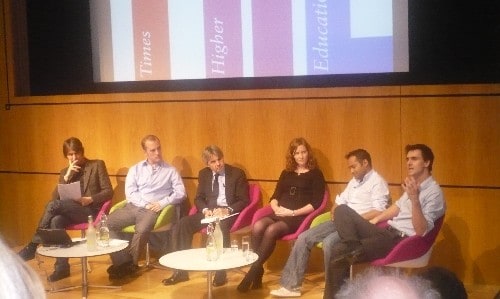
Blue-sky thinkers Lord Drayson (centre) promotes the economic-impact of science
By James Dacey
It is very well-documented that the World Wide Web emerged as an incredibly successful “by-product” of the blue-skies research carried out at CERN. But should all scientists be required to justify their funding by the “impact” of their work on the rest of society?
A new proposal by the UK government would mean that every application for a research grant will require the researchers to detail the direct benefits of their work on the economy, public policy, and a number of other realms.
At a public event in London last night Lord Drayson, the UK Science Minister, was met with a number of concerns from UK researchers who have taken issue with the new scheme.
“We need to change the way we do science in this country. It is perfectly reasonable to expect scientists to do more to demonstrate the importance of what they do,” Drayson told the audience.
“Science should be accountable where science is funded by the tax-payer.
“[The new scheme] is asking people within their grant applications to think about the impact they give and to describe it,”
Perhaps offended by the tone of Drayson’s comments, several people argued that researchers already do this sort of thing as an intrinsic part of their work. One member of the audience dismissed the new scheme as nothing more than “box-ticking” by the Government.
A major sticking point is whether researchers should be assessing the impact of the work that they have already done or the impact of the research they hope to carry out, as this is apparently unclear under the new proposals.
“It would be lovely if we did have a crystal ball which could predict the future applications of our research, but the reality is that most research simply does not work this way as many benefits result from serendipity,” said Colin Stuart an astronomer working at The Royal Observatory in Greenwich, who was also on the panel.
Blue Skies ahead? The prospects for UK science, was hosted by the Wellcome Collection in central London and the event was chaired by Brian Cox, the CERN physicist and presenter of a number of popular science programmes in the UK. You can watch a recording of the debate online.
Earlier yesterday evening, Cox tackled Drayson on the issue of science and economic-impact as part of a new BBC radio series The Infinite Monkey Cage, which you can listen to here.
If you want to have your say regarding the proposed reform then the consultation will run until 16 December. Whatever comes out of this, however, I’m sure many UK physicists will still be left wondering how the Government will put a price on some of the true blue-sky research such as the search for the Higgs.

Higgs Boson Will UK money continue to fund the search for him/her indefinitely?



